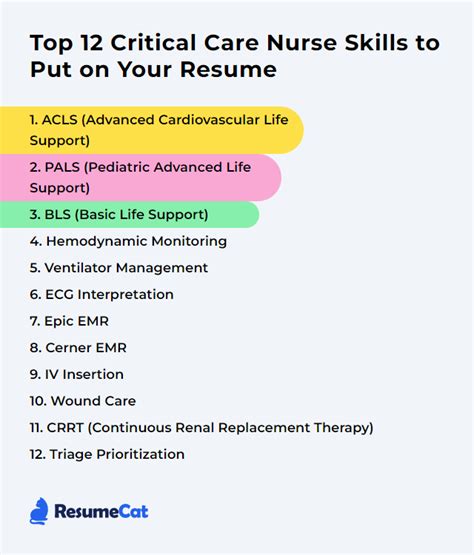As a critical care nurse, you stand at the forefront of healthcare, providing life-saving care to critically ill patients. Your skills and knowledge are essential for ensuring the best possible outcomes for those who need it most. This comprehensive guide will empower you with the critical care nursing skills necessary to excel in this challenging and rewarding field.

Essential Skills for Critical Care Nurses
Assessment and Monitoring
- Perform thorough physical and neurological assessments
- Accurately measure and interpret vital signs (e.g., blood pressure, heart rate, respiratory rate)
- Monitor invasive monitoring devices (e.g., arterial lines, central venous catheters)
- Detect and manage subtle changes in patient status
Ventilatory Management
- Understand mechanical ventilator modes and settings
- Administer and titrate oxygen therapy
- Troubleshoot and resolve ventilator malfunctions
- Monitor and assess respiratory function
Hemodynamic Management
- Manage hemodynamic instability (e.g., hypotension, hypertension)
- Administer and titrate vasopressors and inotropes
- Interpret and respond to hemodynamic waveforms
- Understand fluid resuscitation and electrolyte balance
Pharmacology
- Administer complex medication regimens safely and effectively
- Calculate and titrate medications precisely
- Understand the pharmacodynamics and pharmacokinetics of critical care medications
- Monitor for drug interactions and side effects
Emergency Management
- Recognize and respond to critical events (e.g., cardiac arrest, stroke)
- Perform cardiopulmonary resuscitation
- Use and interpret advanced monitoring equipment
- Collaborate with other healthcare professionals in emergency situations
Sepsis Management
- Early identification and management of sepsis
- Administration of antibiotics, fluids, and vasopressors
- Monitoring for organ dysfunction and septic shock
- Patient education and family support
Documentation and Communication
- Document patient assessments, interventions, and outcomes accurately and comprehensively
- Communicate effectively with patients, families, and other healthcare team members
- Use technology to enhance documentation and communication
Advanced Critical Care Nursing Skills
Extracorporeal Membrane Oxygenation (ECMO)
- Setup, initiation, and management of ECMO circuits
- Monitor and manage patient parameters on ECMO
- Collaborate with the ECMO team in providing patient care
Continuous Renal Replacement Therapy (CRRT)
- Understand the principles and modes of CRRT
- Insert, manage, and maintain CRRT catheters
- Interpret laboratory data and monitor patient response to therapy
Neurocritical Care
- Assess and manage patients with acute neurological emergencies (e.g., stroke, head injury)
- Monitor intracranial pressure and cerebral perfusion
- Administer neuroprotective medications and therapies
- Collaborate with neurosurgeons and neurologists in patient care
Pediatric Critical Care
- Provide specialized care to critically ill infants and children
- Understand the unique physiology and needs of pediatric patients
- Monitor and manage complex medical conditions (e.g., congenital heart defects, respiratory failure)
Tips and Tricks for Enhancing Critical Care Nursing Skills
- Stay up-to-date on the latest clinical guidelines and best practices
- Participate in continuing education and training programs
- Seek mentorship from experienced critical care nurses
- Practice your skills through simulation and mock drills
- Collaborate with other healthcare professionals to enhance patient care
- Build a strong foundation in the principles of critical care nursing
- Focus on providing holistic patient-centered care
- Prioritize safety and risk management at all times
- Use technology and evidence-based protocols to enhance care delivery
FAQs
1. What are the career prospects for critical care nurses?
According to the Bureau of Labor Statistics, the demand for registered nurses specializing in critical care is expected to grow by 15% from 2020 to 2030, much faster than the average for all occupations.
2. What kind of setting can critical care nurses work in?
Critical care nurses can find employment in a variety of settings, including intensive care units (ICUs), emergency departments, cardiac care units, trauma centers, and recovery rooms.
3. What is the average salary for critical care nurses?
The median annual salary for registered nurses specializing in critical care was $83,940 in May 2021, according to the Bureau of Labor Statistics.
4. What are the challenges of being a critical care nurse?
Critical care nursing can be physically and emotionally demanding, requiring nurses to work long hours in high-pressure situations.
5. What are the rewards of being a critical care nurse?
Critical care nurses have the privilege of making a significant difference in the lives of critically ill patients and their families.
6. What kind of education is required to become a critical care nurse?
To become a critical care nurse, you typically need a Bachelor of Science in Nursing (BSN) or an Associate Degree in Nursing (ADN).
7. What certifications are available for critical care nurses?
There are several certifications available for critical care nurses, including the Certified Critical Care Registered Nurse (CCRN) and the Critical Care Registered Nurse (CCRN-K).
8. What are the differences between critical care nurses and other registered nurses?
Critical care nurses specialize in providing care to critically ill patients who require advanced monitoring and interventions. They work in specialized units, such as ICUs, where they manage complex medical conditions and emergencies. Other registered nurses typically provide care to patients in less acute settings, such as medical-surgical units or outpatient clinics.
